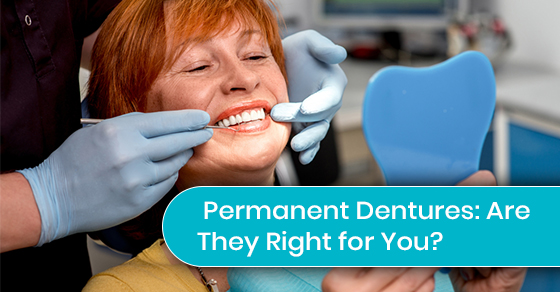
Are you sick of wearing dentures? Today, permanent dentures offer a permanent solution to missing or problem teeth.
Fifty-six percent of individuals who wear dentures feel that they place limitations on all facets of their lives. Your teeth should make you feel good. If you are looking for a long-term solution, permanent dentures are considered to be one of the most effective methods of replacing missing or damaged teeth. One of the primary reasons why permanent dentures are preferred is because they stay in place. They do not need to be “glued” down, and they won’t move around or pop out in the same way that temporary dentures tend to do.
But are permanent dentures the right choice for you? Read on to learn everything you need to know about permanent dentures before talking to your healthcare professional.
What are permanent dentures?
A permanent denture is a kind of dental prosthesis that is fixed or firmly attached to the jaw bone with the help of dental implants. Permanent dentures are not removable like common dentures. This means that they act and feel like natural teeth, and there is no risk of them shifting or falling out.
These types of dentures are easily adapted to the needs of a patient and can be used to replace a full dental bridge, several teeth, or a single missing tooth. The process of installing permanent dentures does require surgery. It involves placing dental implants (titanium screws) into the jawbone to anchor the replacement tooth and keep it in place. Once the area has healed from surgery, the dentures are snapped tightly in place or secured to the anchor using cement.
Who should get denture implants?
Many people of all ages and walks of life can benefit from getting permanent denture implants. However, there are a few requirements to determine if denture implants are right, or possible, for you. Some of these items include:
- Your bones have stopped growing.
- Candidates must have enough bone in their jaw to support the implants.
- The ideal candidates should be in good physical health.
- Individuals who are missing, or have damage to one or more teeth.
- A history of good oral hygiene is important for a speedy recovery.
PROS
There are many pros to getting permanent dentures over traditional dentures. Below are just a few reasons why you should consider this procedure:
- They are stable compared to traditional dentures: they won’t pop out or move around in your mouth.
- They allow you to eat and talk with ease: they don’t float in your mouth while you eat or speak. They make social engagements enjoyable again.
- They last a long time, and you don’t have to worry about misplacing them!
- They require less maintenance: you don’t have to remove them for cleaning. They act and feel like real teeth!
- They eliminate pain and discomfort due to an improper fit or inflamed gums.
- Better facial support: having dentures that you put in and out of your mouth leads to loss of facial structure. This results in wrinkles, witches chin, and marionette lines.
CONS
Besides the usual risks (such as infection) that are associated with invasive procedures, the primary con for permanent dentures is the cost. Getting the implants to keep the permanent dentures in place is an expensive procedure that may not be an affordable option for many patients. Depending on the number of teeth that need to be replaced, the cost of the procedure can become unrealistic. Additionally, most dental insurance does not cover the procedure required to install permanent dentures. The financial burden can cause people to opt-out of getting a service that may better their quality of life in the long run.
What does a permanent denture procedure involve?
Permanent dentures require surgery, and it can take multiple procedures to complete the process.
- Before you get dental implants, you will need to have a dental exam, including X-rays and moulds of your teeth.
- Be prepared to receive local or general anesthesia on the day of your first surgery.
- The jawbone will be prepared for surgery. You may require a bone graft in this stage.
- The dentist will replace tooth roots with metal posts.
- Next, the dentist will place artificial teeth on the posts.
- Enjoy your new teeth!
These steps can take months to complete. Much of that time will be spent healing and letting your jaw grow new bone.
What to expect after the procedure
The first thing you will experience after your permanent denture procedure (or procedures, if there are multiple) is discomfort. You will experience some pain, but when that has subsided, and your mouth has fully healed, all you then have to do is get used to your new compers (which may take a bit of time).
Common side effects of this procedure include swelling or bruising on the face and gums. Use pain medication and cold compresses to help with pain and swelling. A salt-water rinse can also help prevent infection.
Monitor your symptoms, and if they persist or get worse, contact your dentist for a checkup. Some people need antibiotics after dental surgery.
Permanent dentures are one of the best solutions to replace your missing teeth. Why wait to talk to a professional about your options? Talk to one of our seasoned professionals at Bristol Dental Clinic today!
